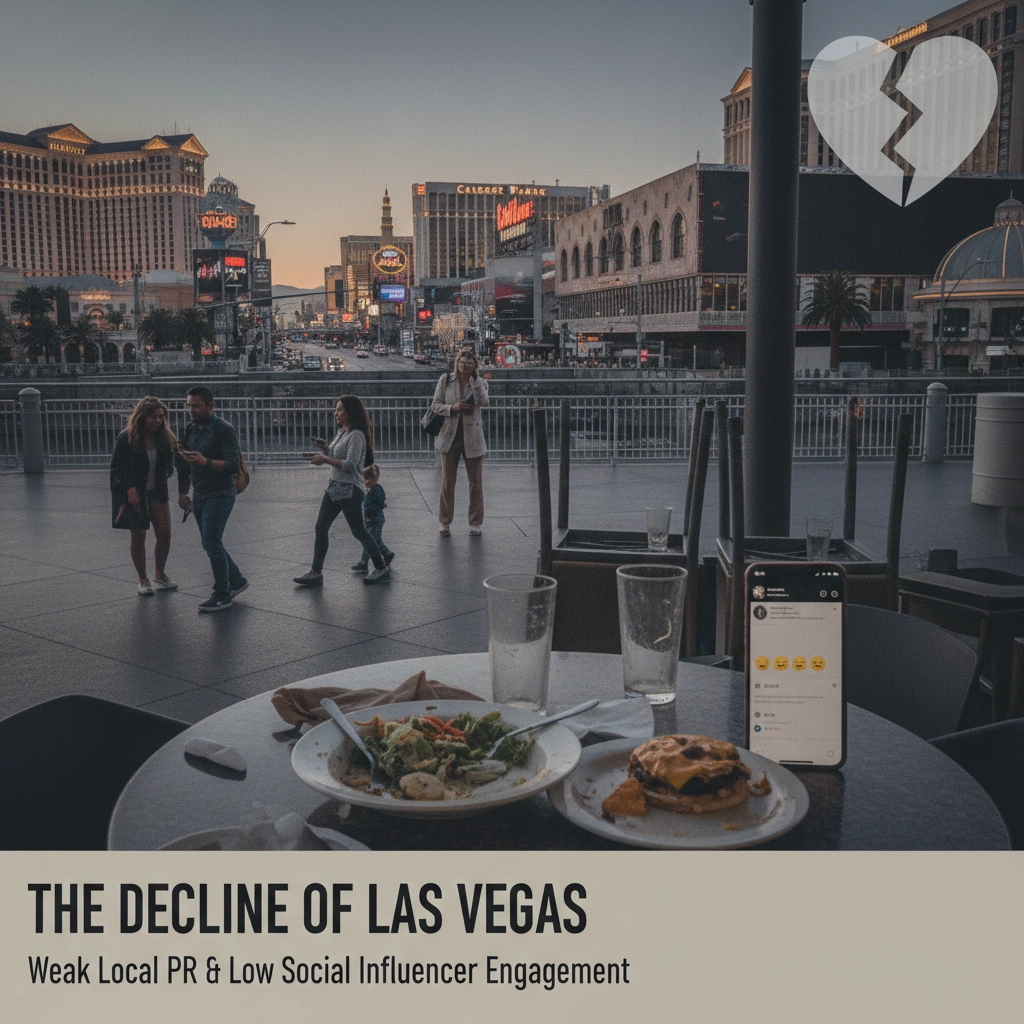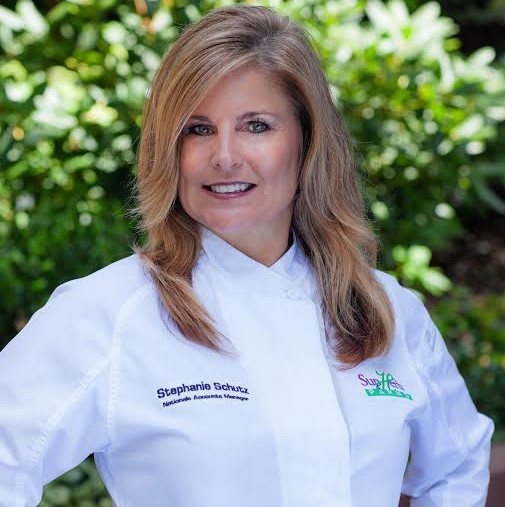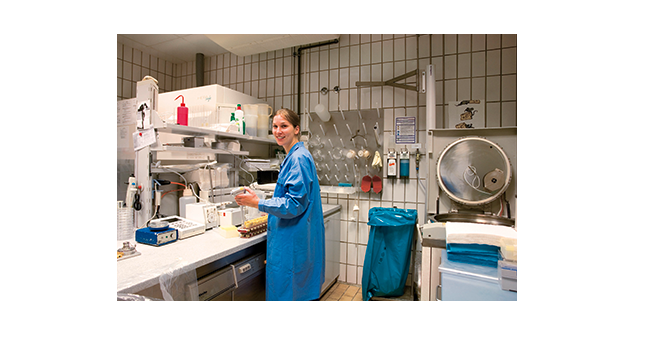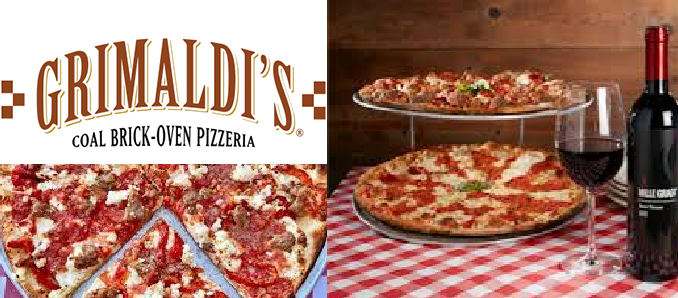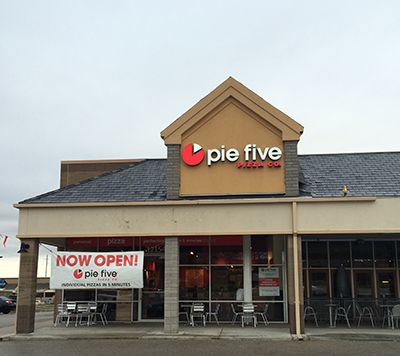The bright lights of Las Vegas are dimming, and it's not just the energy-saving LED conversion. Sin City is experiencing its most significant tourism downturn in years, with visitor numbers plummeting 11.3% in recent months and hotel occupancy dropping nearly 15%. But here's the kicker – while everyone's pointing fingers at economic uncertainty and political factors, the hospitality industry is missing a massive opportunity to leverage modern PR strategies and social influencer engagement to turn things around.
The Numbers Don't Lie: Vegas Is Struggling
Let's cut through the glitz and get to the hard data. Las Vegas tourism decline is real and measurable. Through July 2025, the Strip drew 22.6 million visitors – that's 2 million fewer than the previous year. International visitors have been hit even harder, declining by 13% in June alone. These aren't just statistics; they represent empty restaurant tables, unused hotel rooms, and struggling food and beverage operations across the city.
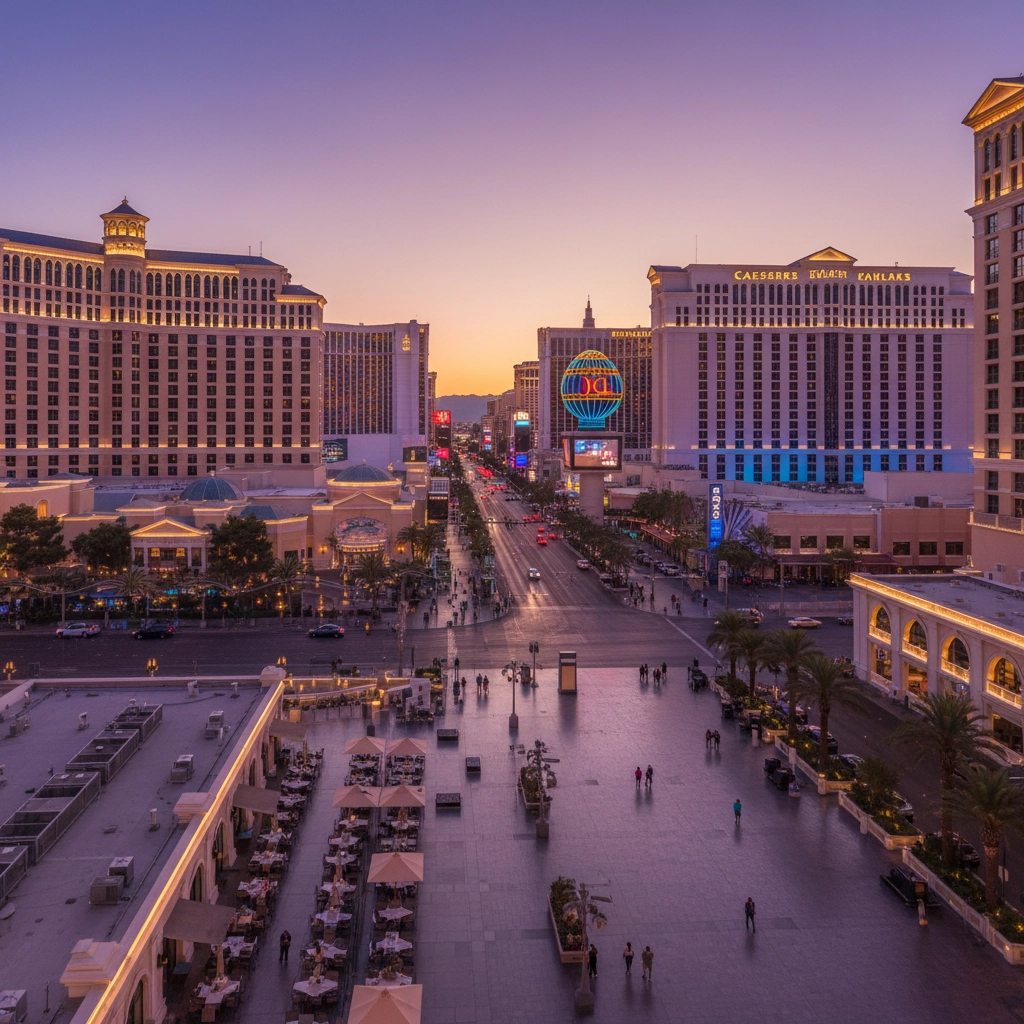
The ripple effect is brutal for hospitality professionals. Casino employees can't find shifts, restaurant revenues are down millions, and the city's legendary energy feels more like a whisper than a roar. Workers like Aria housekeeper Shaleah Taylor describe seeing "fewer visitors on the Strip and emptier casinos" during their shifts – a stark contrast to the Vegas we know and love.
The Real Culprits Behind Vegas Marketing Decline
While economic uncertainty and political factors are major players in this downturn, the hospitality industry's response has been surprisingly passive. Traditional Las Vegas PR problems aren't just about messaging – they're about adaptation. The city's marketing machine, built for a different era, hasn't evolved to match how modern travelers discover and choose destinations.
Economic uncertainty from inflation and higher interest rates definitely plays a role. UNLV economists predict continued declines through 2026 due to a softening national economy. Political tensions, including what Culinary Union leader Ted Pappageorge calls the "Trump slump," have affected international tourism, particularly from Canada.
But here's what the data doesn't fully capture: the missed opportunities in digital engagement and authentic storytelling that could help Vegas weather these economic headwinds better than competitors.
Where Las Vegas Influencer Marketing Falls Short
Social media has become the primary discovery platform for younger travelers, yet Las Vegas tourism challenges include a noticeable gap in authentic influencer partnerships. While other destinations like Nashville are successfully leveraging micro-influencers and food content creators to showcase their unique experiences, Vegas remains stuck in traditional advertising modes.
The viral videos of empty Vegas streets aren't just documenting decline – they're actively contributing to negative perception. When your city's most viral content shows abandoned casinos and empty restaurants, you've lost control of your narrative. Smart influencer marketing could have countered this trend with authentic, positive content showcasing the incredible culinary scene and hospitality innovations that Vegas still offers.
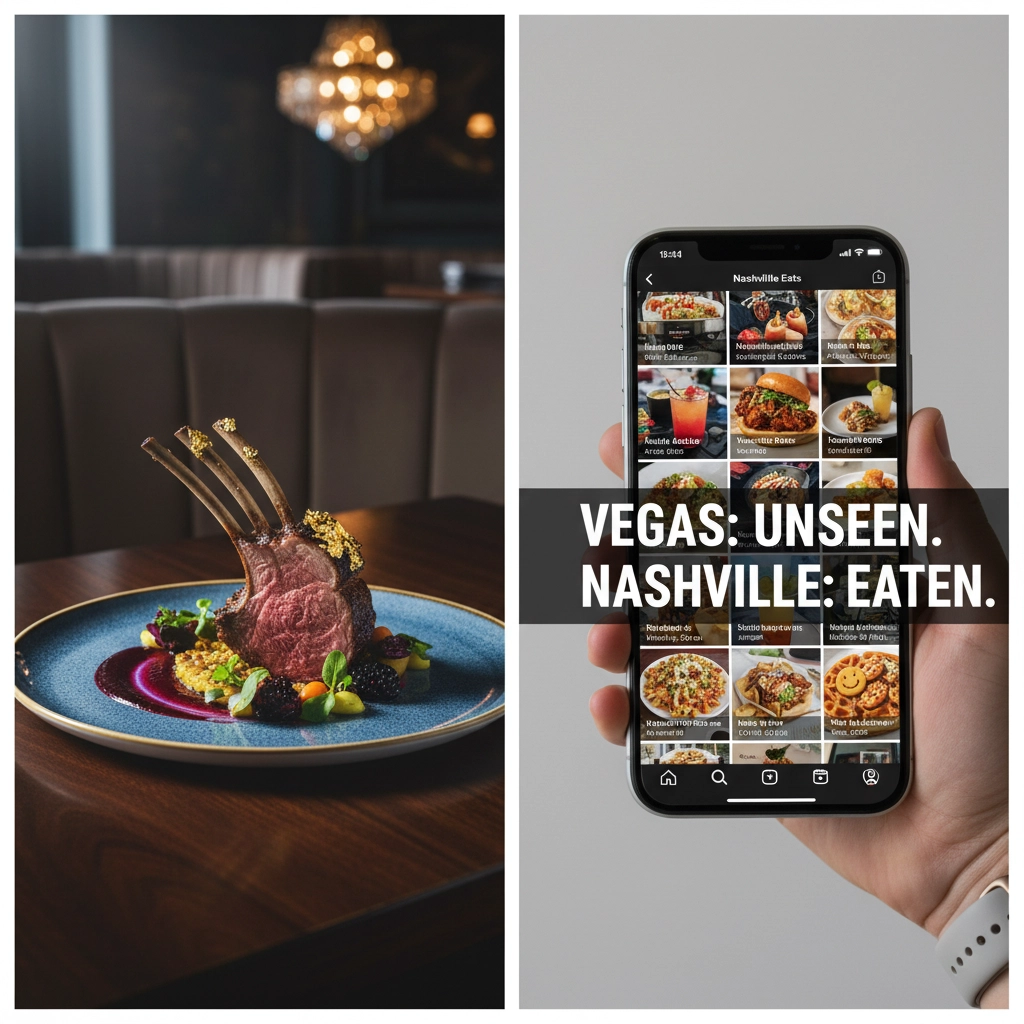
Consider how other hospitality markets have thrived during economic uncertainty by partnering with food influencers, mixology experts, and lifestyle content creators. Vegas has world-class restaurants, innovative cocktail programs, and exclusive dining experiences that should be natural social media gold – yet they're underrepresented in the digital conversation.
The Food & Beverage Opportunity Nobody's Talking About
Here's where it gets interesting for our industry. Las Vegas hosts some of the world's most innovative restaurants and beverage programs. From celebrity chef establishments to cutting-edge mixology, the city's F&B scene should be a content creation machine. Instead, most establishments rely on traditional marketing while their competitors in other markets dominate social feeds with engaging food content.
The disconnect is striking. While restaurant marketing nationwide increasingly focuses on viral flavors and menu innovation, Vegas establishments seem to assume their reputation alone will drive traffic. That strategy might have worked in 2019, but today's diners discover restaurants through TikTok recipes, Instagram stories, and influencer recommendations.
Local PR Agencies: Missing the Mark
The challenge isn't just about social media – it's about understanding how modern hospitality marketing works. Traditional Las Vegas PR firms excel at grand openings and celebrity appearances, but they're struggling with authentic community building and ongoing engagement strategies that drive repeat visitation.
Effective hospitality PR today requires understanding food trends, beverage innovation, and the subtle art of making luxury feel accessible online. It's about creating stories that food and beverage professionals want to share, not just press releases that sound impressive but don't drive action.
Las Vegas resorts have long relied on a small circle of local public relations (PR) firms—a classic “old boy network”—to manage their messaging and media outreach. Unfortunately, that network is badly failing both the resorts and the community. Decades-old relationships have led to stale strategies and complacency; instead of earning positive attention, these firms have become gatekeepers who actively alienate local media.
Local journalists routinely complain about lack of access, tone-deaf spins, and a focus on maintaining upstream casino relationships at the expense of honest storytelling or actual engagement with the city’s press corps. When media is stonewalled or treated dismissively, the quality and authenticity of stories about Vegas resorts decline.
The PR playbook that worked 20 years ago is now broken. Instead of building bridges, the entrenched firms dig deeper foxholes, fostering mistrust and disconnect between some of the world’s most high-profile properties and the local voices that have always given Vegas its character. It’s time for resorts to reconsider the status quo and seek out PR partners who value transparency, local relationships, and fresh ideas—not just cocktail parties and clubby connections.
Competition Is Eating Vegas's Lunch
While Las Vegas grapples with economic headwinds, other destinations are aggressively marketing their hospitality scenes. Nashville's rise as a culinary destination didn't happen by accident – it resulted from strategic partnerships between local tourism boards, restaurants, and content creators who understood how to make their city feel essential rather than optional.
The pricing pressure Vegas faces becomes more problematic when potential visitors can't easily see the value proposition. If your social presence doesn't effectively communicate why Vegas restaurants and experiences justify premium pricing, travelers will choose alternatives that do a better job showcasing their worth.
The Path Forward: Integrated Marketing That Actually Works
The solution isn't just better PR or more influencer partnerships – it's integrated marketing that treats food and beverage experiences as the hero, not the sidekick. Las Vegas needs strategies that showcase its incredible culinary innovation while building authentic connections with potential visitors.
Smart hospitality brands should focus on:
Content partnerships that highlight unique menu items, behind-the-scenes kitchen innovations, and the craft behind signature beverages. Instead of generic "look how fancy we are" content, create stories about the creativity and skill that goes into Vegas dining.
Micro-influencer relationships with food and beverage professionals who can authentically showcase experiences to engaged audiences. A bartender with 10,000 followers who genuinely loves your cocktail program is worth more than a celebrity with millions of unengaged followers.
Community building that extends beyond individual properties to promote Vegas as a culinary destination. When restaurants collaborate on content instead of competing, everyone benefits from increased food tourism.
Making Vegas Irresistible Again
The Las Vegas tourism industry needs to stop relying on its reputation and start earning attention every day. This means treating every restaurant, bar, and hospitality experience as a potential content opportunity that can drive broader destination appeal.
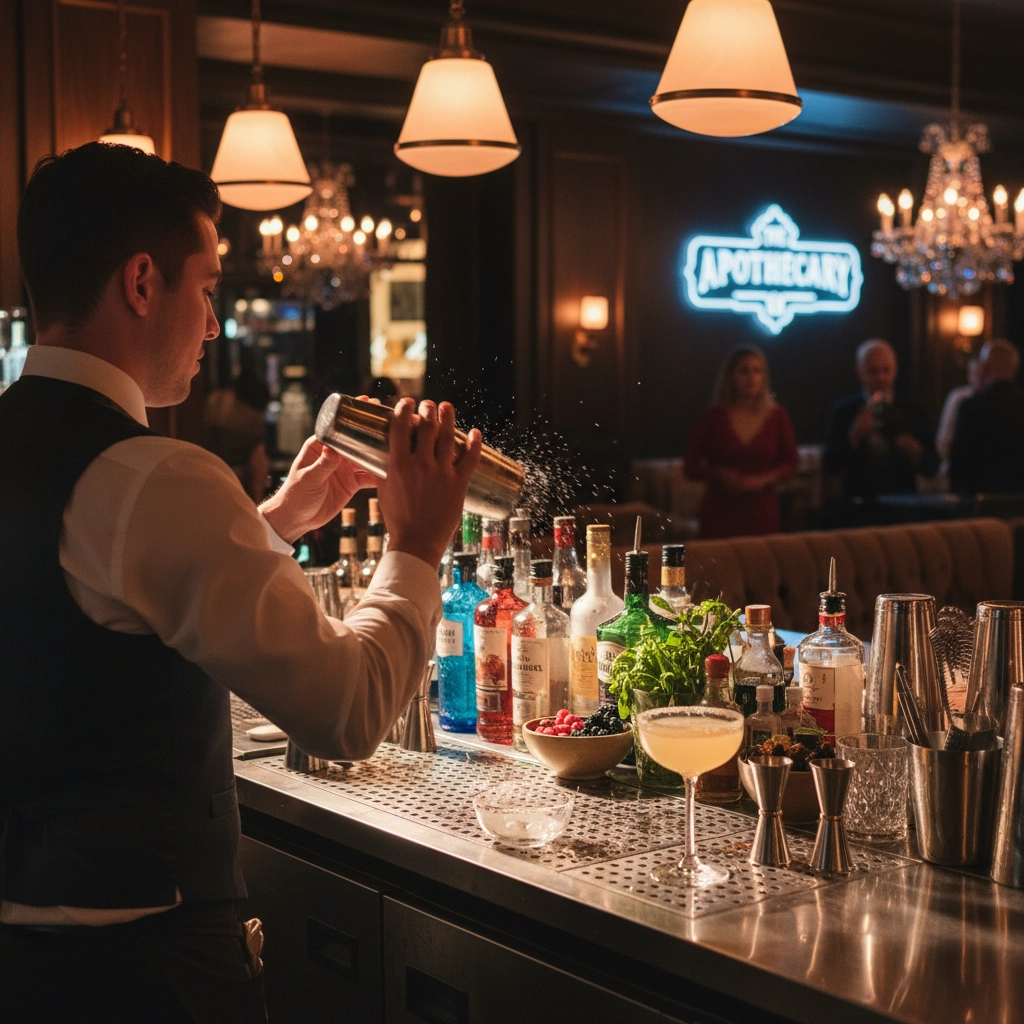
Food and beverage directors, restaurant managers, and hospitality executives have the power to change this narrative. By partnering with skilled content creators who understand both hospitality and digital marketing, Vegas can transform from a city struggling with empty tables to one that's impossible to ignore.
The question isn't whether Las Vegas will recover – it's whether the recovery will be driven by reactive traditional marketing or proactive digital strategies that showcase why the city remains America's premier hospitality destination.
For hospitality professionals looking to drive real results during challenging times, the lesson is clear: authentic content creation and strategic influencer partnerships aren't optional anymore. They're essential tools for survival and growth in a competitive market where attention equals revenue.
Written by Michael Politz, Author of Guide to Restaurant Success: The Proven Process for Starting Any Restaurant Business From Scratch to Success (ISBN: 978-1-119-66896-1), Founder of Food & Beverage Magazine, the leading online magazine and resource in the industry. Designer of the Bluetooth logo and recognized in Entrepreneur Magazine's "Top 40 Under 40" for founding American Wholesale Floral. Politz is also the founder of the Proof Awards and the CPG Awards and a partner in numerous consumer brands across the food and beverage sector.



